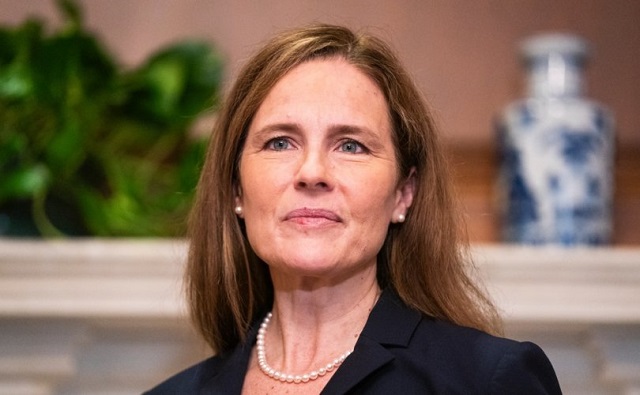International
Supreme Court unanimously rules that public officials can be sued for blocking critics on social media

From LifeSiteNews
Supreme Court Justice Amy Coney Barrett Justice noted that the personal social media accounts of public officials often present an ‘ambiguous’ status because they mix official announcements with personal content.
The United States Supreme Court ruled unanimously on Friday that government officials who post about work-related topics on their personal social media accounts can be held liable for violating the First Amendment rights of constituents by blocking their access or deleting their critical comments.
In a 15-page opinion, Justice Amy Coney Barrett noted that the personal social media accounts of public officials often present an “ambiguous” status because they mix official announcements with personal content.
The court ruled in two cases where people were blocked after leaving critical comments on social media accounts of public officials.
The first case involved two elected members of a California school board — the Poway Unified School District Board of Trustees — who blocked concerned parents from their Facebook and Twitter accounts after leaving critical comments.
The court upheld the 9th U.S. Circuit Court of Appeals ruling that said the board members had violated the parents’ free speech rights.
The second case before the court concerned James Freed, Port Huron, Michigan’s city manager who had blocked constituent Kevin Lindke from commenting on his Facebook page after deleting his remarks about the city’s COVID-19 pandemic policies.
Lindke believed that Freed had violated the First Amendment by doing so and sued Freed.
Freed maintained that he launched his Facebook page long before becoming a public official, arguing that most of the content on his account concerned family-related matters.
Justice Barrett explained:
Like millions of Americans, James Freed maintained a Facebook account on which he posted about a wide range of topics, including his family and his job. Like most of those Americans, Freed occasionally received unwelcome comments on his posts. In response, Freed took a step familiar to Facebook users: He deleted the comments and blocked those who made them.
For most people with a Facebook account, that would have been the end of it. But Kevin Lindke, one of the unwelcome commenters, sued Freed for violating his right to free speech. Because the First Amendment binds only the government, this claim is a nonstarter if Freed posted as a private citizen. Freed, however, is not only a private citizen but also the city manager of Port Huron, Michigan — and while Freed insists that his Facebook account was strictly personal, Lindke argues that Freed acted in his official capacity when he silenced Lindke’s speech.
Barrett concluded:
When a government official posts about job-related topics on social media, it can be difficult to tell whether the speech is official or private. We hold that such speech is attributable to the State only if the official (1) possessed actual authority to speak on the State’s behalf, and (2) purported to exercise that authority when he spoke on social media.
In the end, the high court sent Lindke’s case back to the Sixth Circuit Federal Appeals Court for a second look.
Perhaps reflecting continued ambiguity following the court’s ruling, both defendant Freed and plaintiff Lindke declared victory.
“I am very pleased with the outcome the justices came to,” Freed told ABC News in a statement. “The Court rejected the plaintiff’s appearance test and further refined a test for review by the Sixth Circuit. We are extremely confident we will prevail there once more.”
Lindke was more effusive and told ABC News that he was “ecstatic” with the court’s decision.
“A 9-0 decision is very decisive and is a clear indicator that public officials cannot hide behind personal social media accounts when discussing official business,” said Lindke.
Legal experts called attention to the persistence of gray area in the law regarding social media due to the narrowness of the court’s decision.
“This case doesn’t tell us much new about how to understand the liability of the 20 million people who work in local, state, administrative or federal government in the U.S. … just that the question is complicated,” Kate Klonick, an expert on online-platform regulation who teaches at St. John’s Law School, told The Washington Post.
Katie Fallow, senior counsel for the Knight First Amendment Institute at Columbia University, told the Post that the court’s ruling does not sufficiently address public officials’ widespread use of personal “shadow accounts,” which constituents often perceive as official.
Fallow said the court was “right to hold that public officials can’t immunize themselves from First Amendment liability merely by using their personal accounts to conduct official business.”
We are disappointed, though, that the Court did not adopt the more practical test used by the majority of the courts of appeals, which appropriately balanced the free speech interests of public officials with those of the people who want to speak to them on their social media accounts.
According to The Hill, the Biden administration and a bipartisan group of 17 states and National Republican Senatorial Committee sided with officials, arguing in favor of their blocks, while the ACLU backed the cons
Friday’s ruling is only the first of several this term that deal with the relationship between government and social media.
“On Feb. 26, the justices heard argument[s] in a pair of challenges to controversial laws in Florida and Texas that seek to regulate large social-media companies,” explained Amy Howe on Scotusblog.com. “And on Monday the justices will hear oral arguments in a dispute alleging that the federal government violated the First Amendment by pressuring social media companies to remove false or misleading content. Decisions in those cases are expected by summer.”
Business
Warning Canada: China’s Economic Miracle Was Built on Mass Displacement

If you think the CCP will treat foreigners better than its own people, when it extends its power over you, please think again: Dimon Liu’s warning to Canadian Parliament.
Editor’s Note: The Bureau is publishing the following testimony to Canada’s House of Commons committee on International Human Rights from Dimon Liu, a China-born, Washington, D.C.-based democracy advocate who testified in Parliament on December 8, 2025, about the human cost of China’s economic rise. Submitted to The Bureau as an op-ed, Liu’s testimony argues that the Canadian government should tighten scrutiny of high-risk trade and investment, and ensure Canada’s foreign policy does not inadvertently reward coercion. Liu also warns that the Chinese Communist Party could gain leverage over Canadians and treat them as it has done to its own subjugated population—an implied message to Prime Minister Mark Carney, who has pledged to engage China as a strategic partner without making that position clear to Canadians during his election campaign.
OTTAWA — It is an honor to speak before you at the Canadian Parliament.
My testimony will attempt to explain why China’s economic success is built on the backs of the largest number of displaced persons in human history.
It is estimated that these displaced individuals range between 300 to 400 million — it is equivalent to the total population of the United States being uprooted and forced to relocate. These displaced persons are invisible to the world, their sufferings unnoticed, their plights ignored.
In 1978, when economic reform began, China’s GDP was $150 billion USD.
In 2000, when China joined the WTO, it was approximately $1.2 trillion USD.
China’s current GDP is approximately $18 trillion USD.
In 2000 China’s manufacturing output was smaller than Italy’s.
Today it’s larger than America, Europe, Japan, and South Korea combined.
If you have ever wondered how China managed to grow so fast in such a short time, Charles Li, former CEO of the Hong Kong Stock Exchange, has the answers for you.
He listed 4 reasons: 1) cheapest land, 2) cheapest labor, 3) cheapest capital, and 4) disregard of environmental costs.
“The cheapest land” because the CCP government took the land from the farmers at little to no compensation.
“The cheapest labor,” because these farmers, without land to farm, were forced to find work in urban areas at very low wages.
The communist household registration system (hukou 戶口) ties them perpetually to the rural areas. This means they are not legal residents, and cannot receive social benefits that legal urban residents are entitled. They could be evicted at any time.
One well known incident of eviction occurred in November 2017. Cai Qi, now the second most powerful man in China after Xi Jinping, was a municipal official in Beijing. He evicted tens of thousands into Beijing’s harsh winter, with only days, or just moments of notice. Cai Qi made famous a term, “low-end population” (低端人口), and exposed CCP’s contempt of rural migrants it treats as second class citizens.
These displaced migrant workers have one tradition they hold dear — it is to reunite with their families during the Chinese Lunar New Year holiday, making this seasonal migration of 100 to 150 million people a spectacular event. In China’s economic winter of 2025 with waves of bankruptcies and factory closures, the tide of unemployed migrant workers returning home to where there is also no work, and no land to farm, has become a worrisome event.
Historically in the last 2,000 years, social instability has caused the collapse of many ruling regimes in China.
“The cheapest capital” is acquired through predatory banking practices, and through the stock markets, first to rake in the savings of the Chinese people; and later international investments by listing opaque, and state owned enterprises in leading stock markets around the world.
“A disregard of environmental costs” is a hallmark of China’s industrialization. The land is poisoned, so is the water; and China produces one-third of all global greenhouse gases.
Chinese Communist officials often laud their system as superior. The essayist Qin Hui has written that the Chinese communist government enjoys a human rights abuse advantage. This is true. By abusing its own people so brutally, the CCP regime has created an image of success, which will prove to be a mirage.
If you think the CCP will treat foreigners better than its own people, when it extends its power over you, please think again.
The Bureau is a reader-supported publication.
To receive new posts and support my work, consider becoming a free or paid subscriber.
Artificial Intelligence
UK Police Pilot AI System to Track “Suspicious” Driver Journeys
AI-driven surveillance is shifting from spotting suspects to mapping ordinary life, turning everyday travel into a stream of behavioral data
|
|
-

 International2 days ago
International2 days agoAustralian PM booed at Bondi vigil as crowd screams “shame!”
-

 Uncategorized2 days ago
Uncategorized2 days agoMortgaging Canada’s energy future — the hidden costs of the Carney-Smith pipeline deal
-

 Automotive1 day ago
Automotive1 day agoCanada’s EV gamble is starting to backfire
-

 Agriculture1 day ago
Agriculture1 day agoEnd Supply Management—For the Sake of Canadian Consumers
-

 Alberta1 day ago
Alberta1 day agoAlberta Next Panel calls to reform how Canada works
-

 Business16 hours ago
Business16 hours agoJudge Declares Mistrial in Landmark New York PRC Foreign-Agent Case
-

 Artificial Intelligence15 hours ago
Artificial Intelligence15 hours agoUK Police Pilot AI System to Track “Suspicious” Driver Journeys
-

 Agriculture4 hours ago
Agriculture4 hours agoThe Climate Argument Against Livestock Doesn’t Add Up












